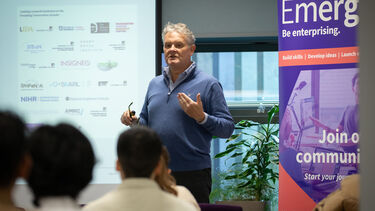University Spinouts: The Sheffield Difference
Sheffield is creating a strong future for University spinouts. With our growing investor network, improving infrastructure and rich talent pool, we are laying the foundations for the next generation of research-driven innovators to thrive.

Here at the University of Sheffield, we are incredibly proud of our recent track record in commercialising research and the momentum that this is building across the city. In 2023, our founders secured an impressive 17 equity deals, placing us fifth among the most active university spinout communities in the UK. We've achieved this success by prioritising market discovery and investing £1 million annually into opportunities via our Commercialisation Journey, a four-stage programme empowering researchers to commercialise and rapidly scale their discoveries.
In the past five years, we've seen 23 new spinout businesses launch from our University, including breakthrough infrared sensor technology firm, Phlux Technology. The company recently announced a milestone £9 million Series A funding round, with backing from Northern Gritstone (in one of its largest investments to date), BGF, Octopus Ventures, and Foresight. This funding will help to accelerate Phlux's expansion into optical communications and sensing industries, leveraging their ground-breaking antimonide semiconductor technology for faster, more energy-efficient systems. The team will also use the funding to grow its workforce, increase production, and launch two new product lines. Phlux’s story isn’t just about individual success - it’s a powerful narrative of how spinouts are part of the Sheffield and South Yorkshire story.
Each new research-driven venture strengthens the South Yorkshire economy and reputation by creating skilled jobs and introducing innovative products to the UK and global markets. Our founders have launched spinouts at one of the fastest rates in the country on a per research pound basis, with our whole portfolio supporting 629 jobs. Sheffield-born spinouts are also clustering into the city centre, attracting global investment and becoming part of the urban regeneration story.
The University of Sheffield’s Commercialisation Journey
A key element of Sheffield's recent successes has been our innovator-led approach to commercialisation. Instead of relying solely on the Technology Transfer Office, we place founders at the heart of the commercialisation process, actively encouraging them to explore their ideas' market potential and providing early-stage investment to nearly all opportunities.
Our researchers are guided through every stage of the Journey with an extensive package of training, mentoring, and funding. They receive dedicated 1:1 support from a member of the Commercialisation Team, along with the space, time, and connections needed to develop business plans and launch their new ventures.
Recognising the time pressures of working in academia, our programme offers researchers the flexibility to explore the commercial viability of their ideas at a pace that suits them – and the option to pause the journey based on their workload. Even if participants choose not to complete the full programme, we are confident they will still take away valuable skills that can further their careers, as well as a deeper understanding of the commercial activities happening at the University.
Bringing together a network of investors and mentors
Our commitment to supporting founders includes building a robust network in Sheffield that can help turn ideas into impact. In partnership with the Universities of Leeds and Manchester, we co-founded investment company Northern Gritstone in 2021 to drive the commercialisation activities of early-stage spinouts that have science and innovation at their core. With offices located in each founding city, Northern Gritstone underpins the levelling up agenda by investing in spinouts from the North of England. In October 2023, Northern Gritstone had raised more than £312 million of investment – and are looking to invest in 10-15 new businesses per year.
We also lead on the Northern Triangle Mentor Network, a programme designed to help innovators navigate challenges and stay on track towards objectives with the support of mentors who are on hand to provide encouragement and support. Last year, the initiative secured £1.5m in funding from the Research England Connecting Capability Fund (CCF) to strengthen regional commercialisation activity and accelerate the growth of early-stage northern spinouts. We have used our portion of this funding to inject capital into opportunities where founders faced unfair barriers to making progress - which forms a key part of our Equality, Diversity, and Inclusion interventions.
The Sheffield Innovation Spine
While providing direct support to founders is key, we also recognise the need for our spinouts to prosper locally, as their long-term success in the region depends on having the right infrastructure surrounding them. Our goal is to develop an ecosystem in Sheffield that is both attractive and supportive to homegrown start-ups and to those from further afield. This requires investment in research facilities, modern office space, incubators, and improved transport links across the North. To achieve this, we're working with local partners such as Sheffield Hallam University, Sheffield Technology Parks, South Yorkshire Mayoral Combined Authority, and Sheffield City Council to develop the Sheffield Innovation Spine.
The Sheffield Spine is a long-term strategic plan focused on developing the infrastructure needed to support the scaling of knowledge-led businesses in the city centre. By creating a connected network linking the University of Sheffield’s campus with existing developments such as West Bar Square and Castlegate, the strategy aims to foster a supportive environment for our spinout pipeline to grow. The two-year project will map out innovation spaces and development opportunities near both of Sheffield’s university campuses, with the aim of providing start-ups with the resources they need to keep talent, intellectual property, and a vibrant innovation culture within our city.
Pennine Five Campus
A key component of the Sheffield Spine strategy involves revitalising unoccupied buildings and giving them a new purpose. Located in the heart of the city, Pennine Five has recently been redeveloped to support growing technology firms in Sheffield. The former HSBC headquarters is now one of the UK’s largest business campuses outside of London, providing over 230,000 sq ft of contemporary and flexible office space over five buildings.
University of Sheffield spinout Phlux Technology's recent move to the Pennine Five campus marks a significant milestone for the city's innovation landscape. As the first research-based start-up to open an office based within the Sheffield Spine, Phlux is proving to be a trailblazer, demonstrating the immense potential of the region's burgeoning spinout scene.
Speaking about the impact of the Sheffield Spine, Phlux Technology co-founder and Professor of Opto-Electronic Sensors, Chee Hing Tan, said:
“Initially Phlux was based in the Kroto building on Broad Lane, as we started with quite a small team. When the business started to grow, we moved to Pennine Five which offers more space and our own lab”.
“Phlux manufactures thousands to millions of devices. The team has to combine their expertise in refining the device manufacturing recipes with the capabilities offered by their partners - and we are still using university facilities to continuously develop our products. I think this is a demonstrable benefit of the Sheffield Innovation Spine. There is also some revenue generated for the University as we are paying to use the facilities as an external customer to manufacture some prototypes and carry out tests” adds Professor Tan.
The latest Sheffield spinout to join the Pennine Five campus is FourJaw, an award-winning manufacturing analytics technology now strategically positioned to further grow its team and work with manufacturers on data-driven insights.
Cultural Industries Quarter
Sheffield Technology Parks, situated in the Cultural Industries Quarter of the city, also serves as a key hub for several other University spinout companies, including Evolutor, Aegiq, and ReNewFood. Last year the site received University funding to transform a corridor of five spaces into labs designed to accommodate spinouts and organically grown science-based businesses. This financial boost, in conjunction with the regeneration activities happening across the city, is contributing to a solution for the previous shortage of suitable spaces for start-ups looking to establish themselves in Sheffield.
Property investors are beginning to actively engage in this evolving landscape. This growing interest signals the significant prospects now available in Sheffield - creating a pipeline of investment and attracting valuable opportunities for private investors in this emerging market.
Building a future for spinouts in Sheffield
The future of University spinouts isn't confined to a select few cities in the south of the UK. In Sheffield, we’re building something better – a place where a combination of talent, investment, and infrastructure come together. With a growing network of mentors and investors, coupled with the long-term vision of the Sheffield Spine, we’re confident the city is building a strong foundation for the next generation of research-driven innovators.




